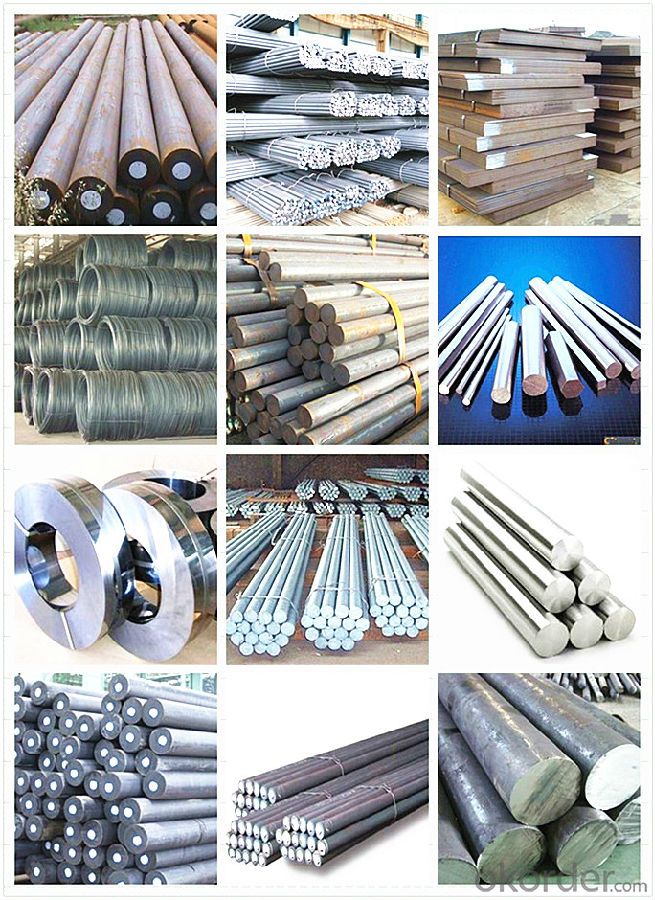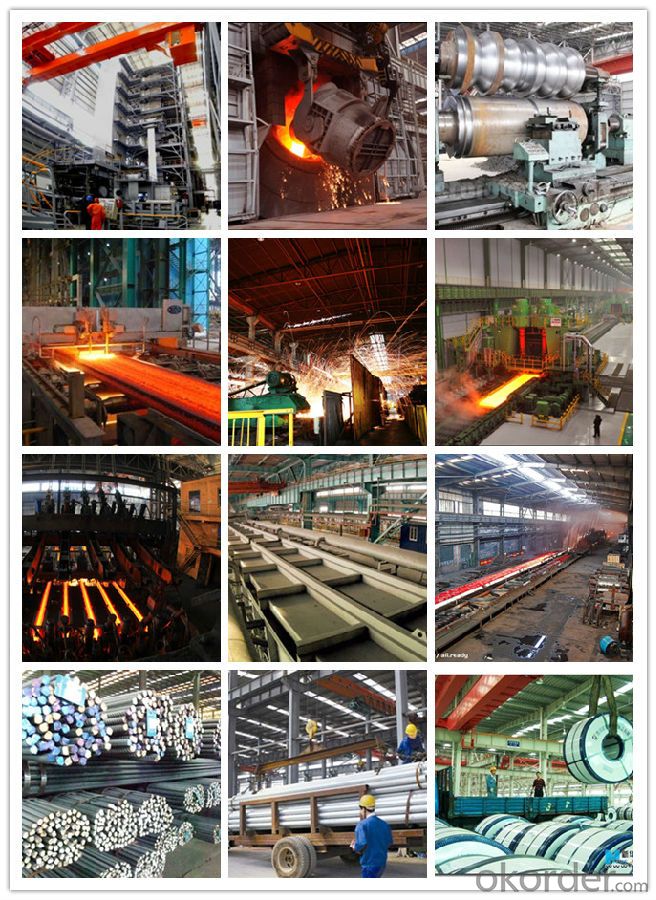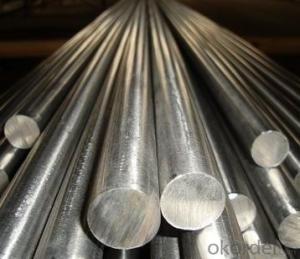Special Steel SAE4140 Alloy Steel Bar 42CrMo4
- Loading Port:
- China main port
- Payment Terms:
- TT OR LC
- Min Order Qty:
- 30 m.t.
- Supply Capability:
- 10000 m.t./month
OKorder Service Pledge
OKorder Financial Service
You Might Also Like
Item specifice
Product Information
1. Grade: 4140 , SAE4140, 42CrMo4, 1.7225
2. Specification: Dia: 16~800mm Length:2000-13000mm or as required
3. Process: EAF+LF+VD
4. Technique:Forged
5.Treatment:hot rolled,cold drawn
6.Mechanical performance:
Strength of extension | 1080MPA |
Yield point | 930MPA |
Elongation | 12% |
Contractibility rate | 45% |
Impacting energy | 63J |
7. Chemical composition(for reference only)
Grade | C | Si | Mn | P≤ | S≤ | Cr | Mo |
SAE4140 | 0.38/0.43 | 0.15/0.35 | 0.75/1.00 | 0.035 | 0.035 | 0.80/1.10 | 0.15/0.25 |
8. Compared grades of 4140 steel
GB-China | AISI-America | DIN-GERMANY | JIS-Japan |
42CrMo | 4140 | 1.7225 | SCM440 |
Product Show

Workshop Show

Shipping
1. FedEx/DHL/UPS/TNT for samples, Door-to-Door;
2. By Air or by Sea for batch goods, for FCL; Airport/ Port receiving;
3. Customers specifying freight forwarders or negotiable shipping methods!
Delivery Time: 3-7 days for samples; 5-25 days for batch goods.
Payment Terms
1.Payment: T/T, L/C, Western Union, MoneyGram,PayPal; 30% deposits; 70% balance before delivery.
2.MOQ: 1pcs
3.Warranty : 3 years
4.Package Informations: 1) EXPORT, In 20 feet (GW 25 ton) or 40 feet Container (GW 25 ton)
2)as customer's requirement
Why choose us?
(1) The leading exporter in China special steel industry.
(2) Large stocks for various sizes, fast delivery date.
(3) Good business relationship with China famous factories.
(4) More than 7 years steel exporting experience.
(5) Good after-sales service guarantee.
- Q:Can special steel be used in the chemical processing industry?
- Yes, special steel can be used in the chemical processing industry. Special steel alloys, such as stainless steel, offer excellent corrosion resistance and high strength, making them suitable for various applications in chemical plants. These steels can withstand the harsh conditions, chemicals, and high temperatures typically encountered in chemical processing, ensuring the safety and efficiency of the operations.
- Q:How does special steel contribute to the aerospace safety?
- Special steel contributes to aerospace safety in several ways. Firstly, special steel is used in the construction of aircraft components such as landing gear, engine parts, and structural supports. These components need to withstand extreme stress, high temperatures, and corrosive environments, and special steel provides the necessary strength, durability, and resistance to ensure the safety and reliability of the aircraft. Secondly, special steel is utilized in the manufacturing of aerospace tools and equipment. These tools are essential for maintenance, repairs, and inspections of aircraft systems. The high strength and toughness of special steel ensure that these tools can withstand heavy use, enabling efficient and accurate maintenance procedures, ultimately contributing to the overall safety of aerospace operations. Furthermore, special steel is also used in the production of safety-critical fasteners and connectors in aerospace applications. These fasteners play a crucial role in holding aircraft components together, and their reliability is paramount for the safe operation of the aircraft. Special steel's excellent mechanical properties, including high tensile strength and resistance to fatigue, ensure the integrity and security of these fasteners, reducing the risk of component failure and enhancing aerospace safety. Overall, the use of special steel in aerospace applications significantly contributes to safety by providing the necessary strength, durability, and reliability required in critical aircraft components, tools, and fasteners.
- Q:What are the properties of wear-resistant alloy steel?
- The properties of wear-resistant alloy steel include high hardness, excellent toughness, resistance to abrasion and impact, good dimensional stability, and high corrosion resistance. These properties make it ideal for applications where wear and tear, such as sliding or impact, is a concern, ensuring durability and longevity of the material in harsh environments.
- Q:Can special steel be used in the renewable energy industry?
- Yes, special steel can be used in the renewable energy industry. Special steel, such as corrosion-resistant or high-strength steel, can be employed in various applications within the renewable energy sector. For instance, it can be used in the manufacturing of wind turbine components, solar panel frames, and hydroelectric infrastructure. The unique properties of special steel make it suitable for withstanding harsh environmental conditions and ensuring long-term durability and performance in renewable energy systems.
- Q:How does special steel perform in terms of thermal expansion?
- Special steel typically has a lower coefficient of thermal expansion compared to other types of steel. This means that it expands and contracts less when subjected to temperature changes, resulting in better dimensional stability and reduced risk of warping or cracking.
- Q:How does special steel contribute to the mining equipment industry?
- Special steel plays a crucial role in the mining equipment industry by providing enhanced durability, strength, and resistance to wear and corrosion. The mining sector relies heavily on robust and reliable equipment, as it operates in challenging and harsh environments. Special steel, which is specifically designed to withstand extreme conditions, helps to improve the overall performance and longevity of mining equipment. One of the main advantages of special steel in the mining industry is its exceptional strength. Mining equipment is subjected to intense forces, such as crushing, impact, and abrasion, which can quickly degrade conventional materials. Special steel, on the other hand, offers superior strength properties, allowing mining equipment to withstand heavy loads and resist deformation or breakage. Furthermore, special steel provides excellent resistance to wear and corrosion, which are common challenges in mining operations. The abrasive nature of rocks and minerals can quickly wear down regular steel, reducing the lifespan of equipment and increasing maintenance costs. Special steel, with its higher hardness and wear resistance, helps to minimize the impact of abrasive materials, prolonging the life of mining equipment and reducing downtime. Corrosion is another prevalent issue in the mining industry, as equipment is often exposed to moisture, chemicals, and harsh environments. Special steel is specifically formulated to resist corrosion, ensuring that mining equipment remains structurally sound and functional even in corrosive conditions. This resistance to corrosion improves the overall safety and reliability of mining operations. Moreover, special steel offers flexibility in terms of design and customization, allowing manufacturers to develop mining equipment tailored to specific needs. By utilizing different grades of special steel, manufacturers can optimize the properties of mining equipment, enabling it to meet the unique requirements of different mining applications. In conclusion, special steel significantly contributes to the mining equipment industry by providing enhanced strength, durability, wear resistance, and corrosion resistance. The utilization of special steel in mining equipment helps to improve performance, extend equipment lifespan, reduce maintenance costs, and enhance safety in mining operations.
- Q:How does special steel perform in abrasive wear conditions?
- Special steel performs well in abrasive wear conditions due to its high hardness and toughness. It has excellent resistance to abrasion, which allows it to withstand the rubbing, scraping, and grinding that occurs in abrasive environments. The unique composition and heat treatment of special steel enhance its ability to resist wear and maintain its structural integrity, making it an ideal choice for applications where abrasive wear is a concern.
- Q:How does special steel contribute to sustainability efforts?
- Special steel contributes to sustainability efforts in several ways. Firstly, special steel is known for its durability and longevity. It has a high resistance to corrosion, wear, and tear, which means it can withstand harsh environments and heavy usage. This durability extends the lifespan of products made with special steel, reducing the need for frequent replacements. By minimizing the consumption of resources and reducing waste generation, special steel helps conserve natural resources and minimize environmental impact. Additionally, special steel is highly recyclable. It can be melted down and reprocessed multiple times without losing its properties or quality. This makes it a valuable material in the circular economy, where resources are reused and recycled to reduce dependence on virgin materials. The recycling process for special steel requires less energy compared to producing steel from raw materials, resulting in lower greenhouse gas emissions and energy consumption. Furthermore, special steel is often used in energy-efficient applications. For example, it is used in the production of wind turbines, which generate renewable energy. By providing a material that can withstand the demanding conditions of wind turbines, special steel contributes to the expansion of clean energy sources. This helps reduce reliance on fossil fuels, decrease carbon emissions, and mitigate climate change. Lastly, special steel plays a crucial role in the transportation sector. It is used in the manufacturing of lightweight, fuel-efficient vehicles, such as electric cars. By reducing the weight of vehicles, special steel helps improve fuel efficiency and decrease greenhouse gas emissions. Additionally, special steel is used in the construction of infrastructure for electric vehicle charging stations, supporting the transition to cleaner transportation systems. In conclusion, special steel contributes to sustainability efforts by promoting durability, recyclability, energy efficiency, and clean energy generation. Its properties and applications help conserve resources, reduce waste, and mitigate climate change, making it an important material in creating a more sustainable future.
- Q:What are the common challenges in heat treating titanium alloys?
- Heat treating titanium alloys can present several common challenges. One of the main challenges is the high reactivity of titanium with oxygen, nitrogen, and hydrogen at elevated temperatures. This reactivity can lead to surface contamination and the formation of undesirable oxides, nitrides, or hydrides, which can affect the mechanical properties of the alloy. Another challenge is the formation of alpha-case, a thick layer of alpha-phase titanium on the surface of the alloy during heat treatment. Alpha-case is brittle and can significantly reduce the fatigue strength and ductility of the material. Therefore, minimizing or eliminating the formation of alpha-case is crucial in heat treating titanium alloys. Furthermore, titanium alloys have a narrow temperature range for effective heat treatment. If the temperature is too low, it may not achieve the desired microstructure and mechanical properties. On the other hand, if the temperature is too high, it can lead to grain growth, which can reduce the strength and toughness of the alloy. Additionally, the heat treatment of titanium alloys often requires precise control of the heating and cooling rates to achieve the desired microstructure and properties. Rapid or uneven cooling can result in non-uniform microstructures, residual stresses, or distortion of the part. Finally, the cost of heat treating titanium alloys can be a challenge. Titanium alloys have a high affinity for oxygen, which necessitates the use of specialized equipment, such as vacuum furnaces or controlled atmosphere furnaces, to maintain a low oxygen environment. These specialized heat treatment processes can be expensive and require careful handling and maintenance to ensure the desired results. In conclusion, the common challenges in heat treating titanium alloys include managing reactivity with oxygen, nitrogen, and hydrogen, minimizing alpha-case formation, achieving the correct temperature range, controlling heating and cooling rates, and dealing with the cost of specialized equipment and processes. Overcoming these challenges is essential to obtain high-quality titanium alloy components with desired properties.
- Q:What are the different surface defects in special steel?
- Special steel can experience various surface defects. Some common defects include: 1. Scale, which is a layer of oxide that forms on the steel's surface during manufacturing. This can be caused by high temperatures or improper cooling, leading to a flaky or powdery appearance. The presence of scale can impact the quality and appearance of the steel. 2. Pitting refers to the development of small holes or depressions on the steel surface. It can be caused by corrosion, inadequate cleaning or surface preparation, or exposure to harsh environments. Pitting weakens the steel and makes it more prone to further corrosion. 3. Scratches are physical marks or indentations on the steel's surface. They can occur during handling, transportation, or processing. Scratches affect the integrity and appearance of the steel, often requiring repair or removal. 4. Roll marks are impressions or patterns left on the steel surface during the rolling process. Uneven pressure or improper alignment of rolling equipment can cause these marks, appearing as lines, grooves, or ridges. Roll marks impact the smoothness of the surface and may necessitate additional processing or polishing for removal. 5. Inclusions are foreign particles or substances embedded within the steel. They result from impurities in raw materials or contamination during manufacturing. Inclusions weaken the steel and have the potential to cause cracks or fractures. 6. Decarburization refers to the loss of carbon from the steel's surface layer. This can occur during heating or annealing processes, resulting in reduced hardness and strength. Decarburization is undesirable in special steel as it negatively affects performance. These are just a few examples of the surface defects that can occur in special steel. It is crucial to identify and address these defects to ensure the quality and performance of the steel product.
1. Manufacturer Overview |
|
|---|---|
| Location | |
| Year Established | |
| Annual Output Value | |
| Main Markets | |
| Company Certifications | |
2. Manufacturer Certificates |
|
|---|---|
| a) Certification Name | |
| Range | |
| Reference | |
| Validity Period | |
3. Manufacturer Capability |
|
|---|---|
| a)Trade Capacity | |
| Nearest Port | |
| Export Percentage | |
| No.of Employees in Trade Department | |
| Language Spoken: | |
| b)Factory Information | |
| Factory Size: | |
| No. of Production Lines | |
| Contract Manufacturing | |
| Product Price Range | |
Send your message to us
Special Steel SAE4140 Alloy Steel Bar 42CrMo4
- Loading Port:
- China main port
- Payment Terms:
- TT OR LC
- Min Order Qty:
- 30 m.t.
- Supply Capability:
- 10000 m.t./month
OKorder Service Pledge
OKorder Financial Service
Similar products
New products
Hot products
Related keywords






























